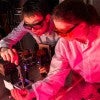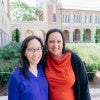
New theoretical model sheds light on ovarian aging, offering path toward advances in women’s health
Researchers have developed a mathematical model that enhances our understanding of ovarian aging and the timing of menopause.

New theoretical model sheds light on ovarian aging, offering path toward advances in women’s health
Researchers have developed a mathematical model that enhances our understanding of ovarian aging and the timing of menopause.

Rice’s Martí, Sarlah, Wang honored with national American Chemical Society awards
Rice’s Martí, Sarlah, Wang honored with national American Chemical Society awards.

In an elegant fusion of art and science, researchers at Rice have achieved a major milestone in nanomaterials engineering by uncovering how boron nitride nanotubes (BNNTs) — touted for their strength, thermal stability and insulating properties — can be coaxed into forming ordered liquid crystalline phases in water.

Turning carbon dioxide into fuel just got easier, thanks to acid bubbles
A team of researchers at Rice has discovered a surprisingly simple method for vastly improving the stability of electrochemical devices that convert carbon dioxide into useful fuels and chemicals, and it involves nothing more than sending the CO 2 through an acid bubbler.

Rethinking how robots move: Light and AI drive precise motion in soft robotic arm developed at Rice
Researchers at Rice have developed a soft robotic arm capable of performing complex tasks such as navigating around an obstacle or hitting a ball, guided and powered remotely by laser beams without any onboard electronics or wiring.

Forging a path to a sustainable carbon economy: Inside the vision of Rice’s Carbon Hub
As the world races to address the climate crisis, a coalition headquartered at Rice is taking a radically collaborative approach to one of the toughest challenges: how to decarbonize industry while at the same time boosting manufacturing, improving infrastructure and securing the supply chains for the energy and materials we rely on every day.

Recently, a team of scientists and engineers at Rice discovered a phenomenon on a microscopic scale, where tiny magnetic particles driven by rotating fields spontaneously move along the edges of clusters driven by invisible “edge currents” that follow the rules of an unexpected branch of physics.

Pasquali named fellow of The Society of Rheology
Rice’s Matteo Pasquali has been elected a fellow of The Society of Rheology (SoR).

Machine learning powers new approach to detecting soil contaminants
A team of researchers at Rice and Baylor College of Medicine has developed a new strategy for identifying hazardous pollutants in soil ⎯ even ones that have never been isolated or studied in a lab.

New roadmap advances catalytic solutions to destroy ‘forever chemicals’
A team of researchers from Rice, Carnegie Mellon University and other leading global institutions has outlined a bold new roadmap for harnessing heterogeneous catalysis to destroy per- and polyfluoroalkyl substances (PFAS), the so-called “forever chemicals” that have contaminated water supplies worldwide.

Menachem Elimelech was honored with the Sidney Loeb Award at the European Desalination Society Conference held in Porto, Portugal, April 28.

Graduate Student Spotlight: Thiago Pinheiro dos Santos ’25
For Thiago Pinheiro dos Santos, a doctoral candidate in chemical and biomolecular engineering from Brazil, research is a way to drive positive, meaningful impact across a wide range of real-world domains from energy innovation to medicine.

Rice graduate programs excel in US News rankings
Rice continues to stand out for its academic excellence with several graduate programs earning high marks in the latest edition of U.S. News & World Report’s “Best Graduate Schools” rankings.

Rice chemical engineering helping to power the energy transition
Rice professors Aditya Mohite and Haotian Wang presented their research and entrepreneurial work at CERAWeek, an annual energy conference in Houston, to industry peers and leaders from around the world the week of March 10.

Rice and UH scientists redefine chemical manufacturing method to solve carbon capture problem
A team of scientists led by Haotian Wang, associate professor in chemical and biomolecular engineering at the George R. Brown School of Engineering and Computing at Rice, and Xiaonan Shan, associate professor of electrical and computer engineering at University of Houston, have discovered simple yet elegant solutions to address a fundamental issue in carbon capture and utilization technology.